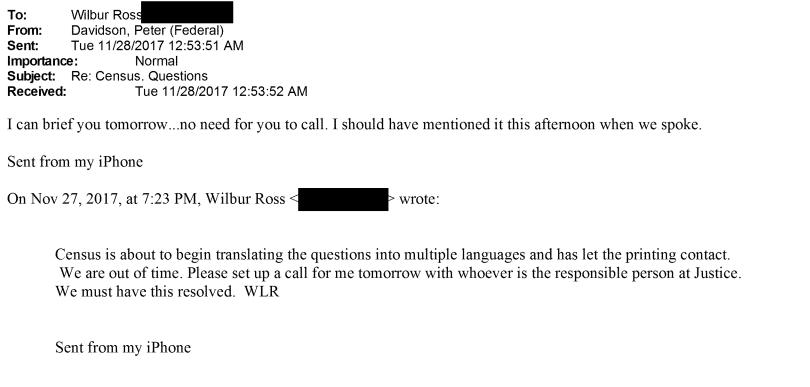Commerce Secretary Wilbur Ross pressured the Justice Department to add a controversial citizenship question to the 2020 decennial census, months prior to the department’s formal request, a recent court disclosure reveals.
The revelation comes as 7,500 pages of documents and emails were released last week by the Trump administration following an order from a federal judge, related to a lawsuit filed earlier in July by several state and local governments and advocacy groups concerned about the citizenship question. According to The New York Times, the suit claims such a question would “fatally undermine” the census’ accuracy, as legal and undocumented immigrants would likely decline to submit their forms.
“Where is the DoJ in their analysis?” Ross wrote in an August 2017 email to the department’s Office of Policy and Strategic Planning Director, Earl Comstock. “If they still have not come to a conclusion please let me know your contact person and I will call the [attorney general].”
According to NPR’s Hansi Lo Wang, Comstock sent a “draft memo” on a citizenship question back to Ross, one which he collaborated on with James McHenry, director of the Justice Department’s Executive Office for Immigration Review. A follow-up email in August 2017 showed the two had made little progress on the matter, and on November 27, Ross emailed the Commerce Department’s general counsel to warn that they had run out of time and needed to push things through.
“Census is about to begin translating the questions into multiple languages. We are out of time,” he wrote. “Please set up a call for me tomorrow with whoever is the responsible person at Justice. We must have this resolved.”

According to the Washington Post, Attorney General Jeff Sessions also supported adding the question, and in response to Ross’ requests, said his office was “eager to assist” in any way possible.
The emails contradict Ross’ previous version of events, which he relayed to the House Ways and Means Committee in March. At the time, the secretary claimed the Justice Department had “initiated the request for inclusion of the citizenship question” on its own in December 2017. A letter from the Justice Department’s general counsel to Acting Census Bureau Director Ron Jarmin that month, asking permission to reinstate the citizenship question, backed up his claim.
“Department of Justice, as you know, initiated the request for inclusion of the citizenship question,” he said. “… Because it is from the Department of Justice, we are taking it very seriously, and we will issue a fulsome documentation of whatever conclusion we finally come to.”
Lawmakers on Capitol Hill have leapt to condemn Ross over that inconsistency.
“These just-released emails between Secretary Ross and his staff make it clear that voting rights enforcement was nothing more than a manufactured ruse to justify adding a citizenship question and that the secretary lied to Congress when he said it was DOJ that “initiated the request,'” Rep. Carolyn Maloney (D-NY) said in a statement. “The House Oversight and Government Reform Committee needs to hold hearings and conduct an investigation into this matter to determine what else the Administration has tried to hide about the 2020 Census.”
The decision to add the citizenship question — which was last included in the decennial survey in 1950 — has been criticized by Democratic lawmakers and local officials who say doing so could discourage immigrants and minority communities from being counted in the census. Because of the Trump administration’s aggressive immigration policies, many might refuse to respond to enumerators, worried they could be targeted for deportation or review.
An undercount might also disproportionately affect blue states with large immigrant populations, inflating Republican representation and under-representing marginalized populations in Washington and at the state level.
“The DOJ’s request to add a question on citizenship in the 2020 census dramatically increases our concerns about the already troubled census,” a group of Democratic senators — including Sens. Dianne Feinstein (CA), Kamala Harris (CA), Catherine Cortez Masto (NV), Brian Schatz (HI), and Tom Carper (DE) — wrote in a letter to Jarmin this past January.
“Such a question would likely depress participation in the 2020 Census from immigrants who fear the government could use the information to target them,” they added. “It could also decrease response rates from U.S. citizens who live in mixed-status households, and who might fear putting immigrant family members at risk through providing information to the government.”
The Census Bureau has struggled with funding cuts and missed testing deadlines in recent years, as it attempts to overhaul the decennial survey and go digital. As ThinkProgress previously noted, a promised list of “tech milestones” that the Bureau promised to present before the Oversight Committee in November 2016 never materialized, and a centralized data processing has floundered under the weight of its own development needs.
With the Trump administration’s persistent cost-cutting measures and Congress using the census like a bank, the decennial survey has also dropped on the list of government priorities, leaving the bureau fighting to deal with a long list of last-minute issues, the citizenship question only the latest hurdle.

